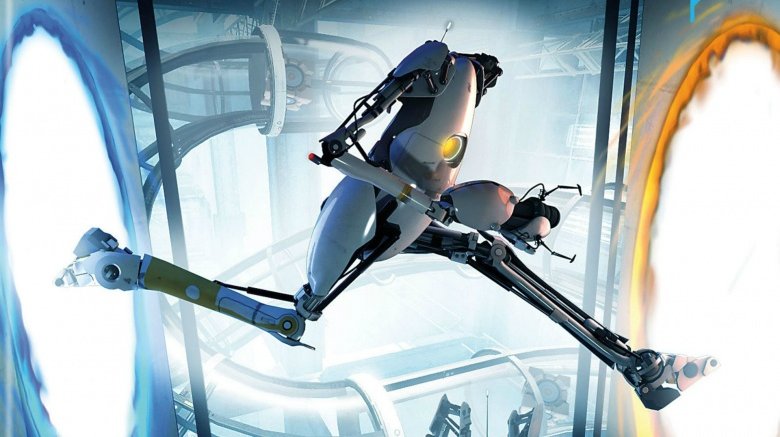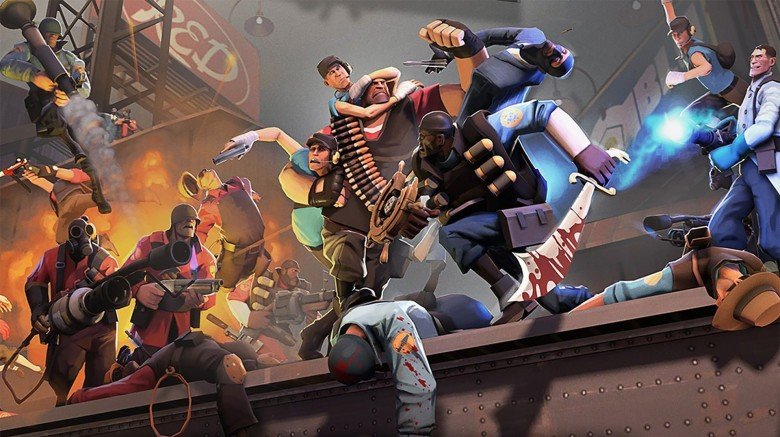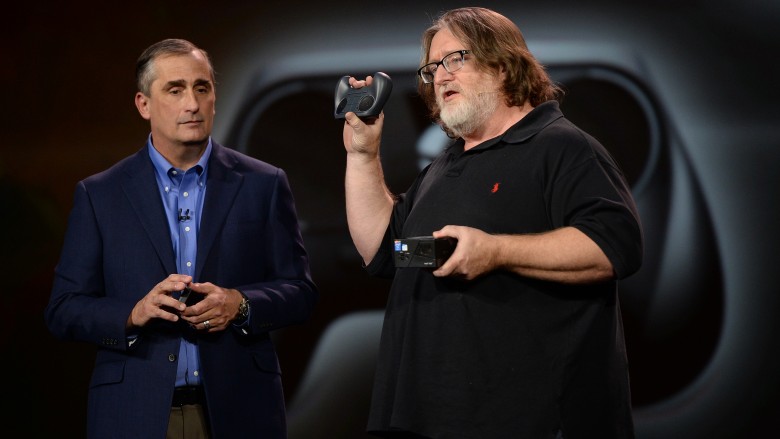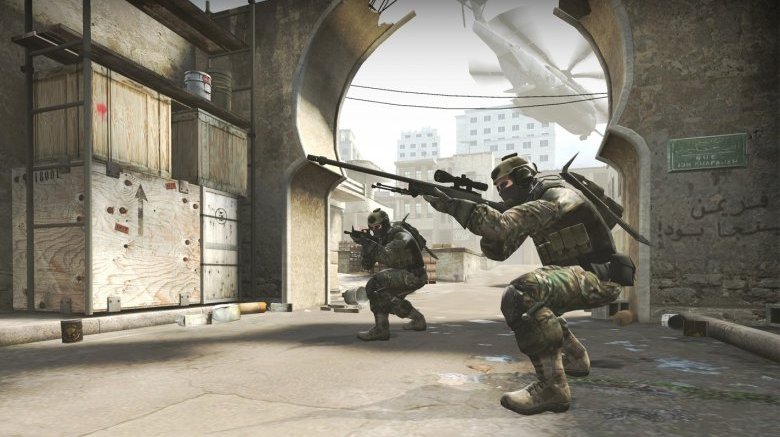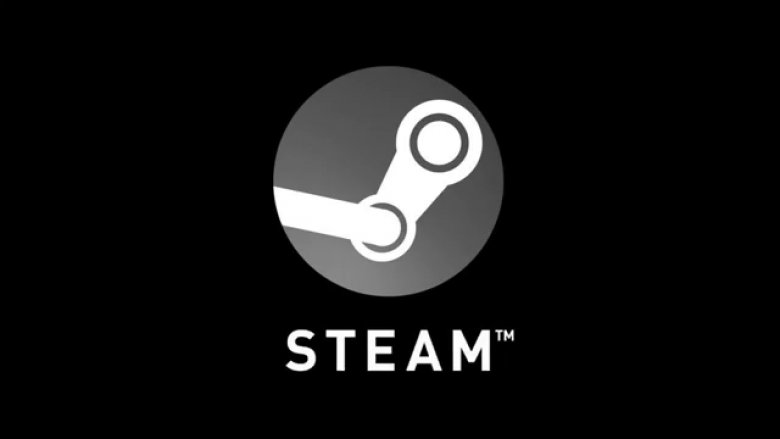Secrets Valve Doesn't Want You To Know
Valve used to be a game developer. Then, it became the owner of the largest online market for PC games, a PC-console hybrid distributor, a proponent of in-home VR for gaming and design, a manufacturer of PC peripherals, and a (part-time) game designer. Valve has done some sketchy things either to increase its bottom line or just because of ... reasons, all of which they would probably prefer if people didn't know about. So here are a bunch of Valve's secrets.
Valve made a killing on the CS:GO gambling scandal
Back when Valve made video games, Counter-Strike combined collaborative and competitive gameplay styles into a new, objective-based team game with a unique terrorists versus counterterrorists gimmick. Valve's latest addition to the series, Counter-Strike: Global Offensive, introduced gun skins — purely cosmetic textures that add nothing to the gameplay — available for purchase.
CS:GO skins have spawned third-party "not gambling" sites. By law, kids can't actually gamble, but naturally all the "not gambling" these kids did netted Valve a whole lot of moolah during the three years before the company sent out cease-and-desist letters to the third-party sites.
Let's say you're a poker chip manufacturer. (In this thought experiment, your name is Jane Valve.) In your factory, you make poker chips, which you call skin chips. Some of the skin chips come in cases — if a customer acquires one and wants to see what's inside, that person can pay a case-opening fee to your company.
In addition to manufacturing skin poker chips and cases, you make a gadget called an API, which lets skin poker chip purchasers, like online casinos, shuffle chips around in bulk and give your company a cut every time. Suddenly, after three years of quiet complicity (and amassing millions of dollars from gambling-related transactional fees), your company announces that every single casino in town has ten days to shut down, quit using your API gadget, and either abandon the skin poker chip game altogether, or face court for violating the company's official anti-gambling policy.
For Valve, it seems clear that money often speaks louder than ethical obligations.
Westerners can blame Valve for the loot box craze
If you're a gamer today, you know you can't get away from loot boxes. Loot boxes, which are "psychologically akin to gambling," according to more and more academic research, are just everywhere. The exciting-dreadful dice rolls that should really end as soon as possible got their start in Chinese and Korean MMORPGs, says US Gamer, but received their first broad introduction to the West in Team Fortress 2 when the game transitioned into that luvverly free-to-play model that helped the game really take off. But it was great that the game became free, right? Well ... depends what side you're on. For players, the transition to F2P multiplied the userbase by five, according to PC Gamer. That's crucially important for a multiplayer game, obviously. For Valve, the transition to "free-to-play" actually came out to a 12x multiplier on the game's monthly revenues. Ahh. Freedom. And now we get to experience the joy of loot boxes in lots of other games, too.
The flat structure is a lie
When Valve says, "structure happens," emphasizing its project-specific, informal hierarchies, what they're really saying is, "Structure doesn't exist until we say it does."
Valve's former employees have spoken out against what they allege to be a cliquish corporate culture, made all the more frustrating by the company's claims of flat organization. There's no evidence that Valve's "cabals" — informal teams of designers — magically appear based on employees' shared goals, yet mountains of exculpatory evidence exist to suggest a pecking order behind the scenes.
Former Valve employee Jeri Ellsworth says she "found out the hard way is that there is actually a hidden layer of powerful management structure in the company ... [It] felt a lot like high school. There are popular kids that have acquired power in the company, then there's the trouble makers, and everyone in between." She struggled to thrive in the "unstructured" environment. Recruiting became an issue, too. "We would interview very talented people but they would be rejected by the old timers at Valve as not fitting the culture ... [Valve] promised me the world and then backstabbed me." No wonder she left in 2013.
Seriously, working at Valve may completely suck
You'd think that working somewhere as high-profile as Valve would be just the bee's knees, wouldn't you? It's a tech startup, and those are always amazing. Their employee handbook doesn't take itself too seriously — it could even be described as a fun read, which makes it probably one of the only desirable employee handbooks in the world. So what could go wrong?
Depending how much trust you're willing to extend to people who make anonymous claims on the internet, possibly a lot of things could go wrong. According to PC Gamer, former Valve employee Rich Geldreich let loose in July 2018 with a lot of info about a company (which is probably Valve) he doesn't like. First, he says the employee handbook was intentionally leaked as a sneaky PR move. He says a lot of your compensation was based on bonuses that encouraged backstabbing and manipulation because the only way to get bonuses was through peer review committees. If we take the Jeri Ellsworth's comment that it felt a lot like high school, it would basically be like if all your grades were determined entirely by groups of other students with no teacher involvement, and then also if those grades were directly tied to your allowance. Better set aside some of your lunch money for bribes.
The Better Business Bureau has no love for Valve
At press time, Valve has an F rating from the Better Business Bureau. Many older complaints stem from the years when Steam had no refund policy and account theft was a regular occurrence. With digital software distribution, refunds should be simple. But for years, Valve met requests for refunds with convenient silence.
Meanwhile, Greenlight and Early Access saturated Steam's market with buggy, glitchy, vaguely game-shaped monstrosities that pretended to be quality products. It took an Australian court charging Valve $2.1 million to finally inspire the company to craft a reasonable refund policy.
Newer complaints allege that Valve offers minimal assistance should an account be hijacked. In fairness, Steam Guard has substantially increased security for users, but it's only preventative — what if your account has already been compromised? According to several complaints, that's when Valve's forum-based, mostly peer-to-peer customer service's inadequacies become most glaring. Simply put, there is no customer service line. For gamers with 1,000+ games in their library, the thought of suddenly losing access is nightmarish. The thought that such a theft could be permanent is horrifying.
Per the BBB's Valve page: "On July 1, 2013, BBB notified the company of the complaint pattern. To date, the company has not responded to BBB's request to address the pattern." Another unanswered grievance, par for the course for Valve.
Steam is a monopoly, and it might be bad for gaming
If you're a PC gamer, you probably have Steam installed. Heck, if you even just own a PC and you once downloaded a game on it, you might have Steam installed. Steam is pretty much everywhere, and it's really freaking easy to use, which is why it has a near-monopoly on PC game sales. Steam first hit the digital ground as an update service for Counter-Strike, then really billowed out into the world in 2004 when Valve included it as a mandatory installation with Half-Life 2. It really, really sucked at first, but the service got better over time. However, it has no meaningful competition and can do kinda whatever it wants. This, argues Tim Colwill in an opinion piece for Polygon, is not great for anyone except Valve.
Gamers even rebelled against other companies that tried to do the same thing. Colwill notes that a mandatory installation of EA's Origin service to play Battlefield 3 was wildly unpopular in 2011. It was okay for Steam to have the place of privilege on our machines, but no one else should be trusted. Valve has run into plenty of other issues, many covered here, including the yearslong wait to offer customers refunds and its terrible updating of titles like CS:GO after it established market dominance. But don't worry, Valve. No matter how poorly you treat us, we will always be loyal ... for some reason.
Valve has no idea what it's doing with adult content
So Valve has done a lot, but they've also not done a lot. Precisely, they didn't allow explicitly adult content on Steam for a long time. While games like the Witcher series or the Mass Effect series or Far Cry 3 all have plenty of bonin' in them, the bonin' is not the main focus of the games and Steam hasn't had any problem making oodles of money off them. Games that are all about body parts getting unclothed and subsequently mashed together have had a much harder time of it. Here's what's going on as of this writing.
In May 2018, Steam decided to get serious about in-game friskiness and ordered some developers to get censoring or get their content off the service. But the games being accused didn't actually have anything that awful in them, according to PC Gamer, and some had even cleared their content with Steam before releasing. After an inevitable backlash, Valve decided to turn Steam into a free-for-all. No games would ever be removed unless they were illegal or "straight-up trolling" games. This was also not a popular decision. By September 2018, Valve had debuted an adult filter that would keep children from getting the deepest cuts of the adult gaming world, and that same month, Steam's first going-all-the-way adult game, Negligee: Love Stories, was released. What will happen next? Will Valve be able to keep its hands out of the situation to the satisfaction of the gaming community? And how long can Valve stay out of the headlines? Only time will tell.
